
College player: Don’t forget the phrase ‘student-athlete’
WINDOW ROCK
For proof that the system is still working, the Native American Basketball Invitational Foundation has to look no further than Brad Greene.
The Paiute-Shoshone tribal member in Lone Pine, California, completed his redshirt junior season as a member of the UC Irvine men’s basketball program this past spring.
As a NABI alumnus, Greene said his experience has equipped him to be a successful student-athlete, as the foundation “is committed to supporting Native American youth by implementing programs that encourage higher education, sports, health & wellness and community building.”
“The experiences that I’ve had at NABI have really helped me become the person who I am today,” Greene said during the 2020 NABI Foundation Virtual Educational Youth Summit last week. “Not only in academics and athletics, but just overall as a person. The tools they gave me have been really rewarding.”
This past season, the 6-11 center played 32 games with 31 starts for the Anteaters. UC-Irvine finished the season at 21-11 overall, which included a first-place finish in Big West play with a 13-3 conference mark.
Greene played a vital role in the team’s success as he averaged 9.0 points, 7.7 rebounds and 1.4 blocks per game. He had a team-high nine double-doubles and led the team in rebounding 17 times.
On Jan. 21, he set a new Bren Event Center record with a career-high 21 rebounds against Hawaii. He also registered a season-high 18 points with a dozen rebounds and four blocks against CSUF on Feb. 1.

Submitted
Brad Greene, a Lone Pine Paiute-Shoshone tribal member, credits his NABI experience for setting him up to be a successful student-athlete on the UC Irvine men’s basketball team. Greene averaged 9.0 points, 7.7 rebounds and 1.4 blocks per game as a redshirt junior for the Anteaters.
Despite his exploits, Greene stressed the importance of balancing his time and effort between the basketball court and the classroom.
“One of the biggest things I was told when I got to college was the phrase ‘student-athlete,’” said Greene, who is pursuing a double major in sociology and educational science. “Without your education and without succeeding in the classroom, there is no basketball for you.
“Once you get there both aspects become your job,” he added. “Knowing how to balance both is very crucial and very critical to your success at college.”
To achieve that, Greene said the biggest skill he learned was time management.
“While you’re at college you’re expected to put the work in, whether that’s working on your game or academics,” he said.
Sometimes, he said, you’re asked “to put in more time than what’s required.”
Greene advised prospective college students who earn scholarships to be ready to perform on and off the court.
“If you’re not doing one of them you’re not upholding your part of the contract,” he said. “It leaves the coaching staff at a discretion to do what they need to do. You got to either succeed or you’re not going to be there, so you really got to prioritize what you’re going to do.”
Despite showing success at the collegiate level, Greene painted a bleak picture of his playing days while in high school.
“When I first started high school I never thought about college,” he said. “There weren’t too many people that I knew that were going to college or pursuing athletics in college so I didn’t have that idea of going to college.”
It wasn’t until his sophomore season that Greene realized that his basketball skills could land him on a collegiate team as he got introduced to playing travel ball.
He got his start by playing with a traveling team from Las Vegas, Nevada. It required him to make the one-way, four-hour trip to Sin City to get his name out there.
“I had to travel a lot to get my name out there and get exposure,” he said. “I had to try and get college coaches willing to drive out (to Lone Pine) to see me. It was a long journey but I had to start somewhere.”
Greene credited his mother, Marjianne Yonge, and grandparents for the sacrifices they made for him to attend his summer tournaments.
“They were willing to drive me, and they were willing to push me,” he said, while adding that he had to prove his worth by staying committed.
“If I didn’t show that to my mom or grandpa I don’t think I would be where I am today,” he said. “They really took hold (of what I was doing). I spent a lot of hours at the park, a lot of hours in the gym trying to work on my game.”








 Highway 264,
Highway 264, I-40, WB @ Winslow
I-40, WB @ Winslow